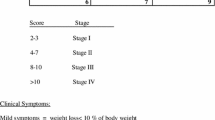Abstract
Background
In patients with colorectal cancer peritoneal carcinomatosis (CRPC), only patients with a complete cytoreduction will benefit. The current selection criteria are ill-defined. The Peritoneal Surface Disease Severity (PSDS) staging was introduced as a basis of scoring patients into prognostic groups to improve patient selection. This study determines the impact on survival of the PSDS in a cohort of patients undergoing complete cytoreductive surgery (CRS) and hyperthermic intraperitoneal chemotherapy (HIPEC) for CRPC.
Materials and Methods
A retrospective review of two prospective databases of patients with complete CRS and HIPEC for CRPC was performed to score patients on the PSDS. Survival was analyzed using the Kaplan-Meier method. Univariate and multivariate analyses were performed to determine the impact of various clinicopathological factors on survival.
Results
There were 56 patients who underwent complete cytoreduction and HIPEC. Of these, 6 patients (11%) were PSDS stage I and median survival (MS) has not been reached, 33 patients (59%) were PSDS stage II and MS was 38 months, 10 patients (18%) were PSDS stage III and MS was 24 months, and 7 patients (13%) were PSDS stage IV and MS was 7 months. Univariate analysis demonstrated the association of clinical symptoms (P = .022), PSDS (P = .002), and tumor histopathology (P = .074) as factors affecting survival. Multivariate analysis demonstrated that PSDS (P = .002) was an independent positive predictive factor associated with survival.
Conclusions
In patients with CRPC who undergo a complete cytoreduction and HIPEC, the PSDS staging system has been demonstrated to be an important prognostic indicator. It appears that even with a complete cytoreduction and HIPEC, patients with PSDS stage IV do not benefit from treatment.


Similar content being viewed by others
References
Sadeghi B, Arvieux C, Glehen O, Beaujard AC, Rivoire M, Baulieux J, et al. Peritoneal carcinomatosis from non-gynecologic malignancies: results of the EVOCAPE 1 multicentric prospective study. Cancer. 2000;88:358–63.
Jayne DG, Fook S, Loi C, Seow-Choen F. Peritoneal carcinomatosis from colorectal cancer. B J Surg. 2002;89:1545–50.
Hurwitz H, Fehrenbacher L, Novotny W, Cartwright T, Hainsworth J, Heim W, et al. Bevacizumab plus irinotecan, fluorouracil, and leucovorin for metastatic colorectal cancer. New Engl J Med. 2004;350:2335–42.
Cunningham D, Humblet Y, Siena S, Khayat D, Bleiberg H, Santoro A, et al. Cetuximab monotherapy and cetuximab plus irinotecan in irinotecan-refractory metastatic colorectal cancer. New Engl J Med. 2004;351:337–45.
Sugarbaker PH, Jablonski KA. Prognostic features of 51 colorectal and 130 appendiceal cancer patients with peritoneal carcinomatosis treated by cytoreductive surgery and intraperitoneal chemotherapy. Ann Surg. 1995;221:124–32.
Verwaal VJ, van Ruth S, de Bree E, van Sloothen GW, van Tinteren H, Boot H, et al. Randomized trial of cytoreduction and hyperthermic intraperitoneal chemotherapy versus systemic chemotherapy and palliative surgery in patients with peritoneal carcinomatosis of colorectal cancer. J Clin Oncol. 2003;21:3737–43.
Glehen O, Kwiatkowski F, Sugarbaker PH, Elias D, Levine EA, De Simone M, et al. Cytoreductive surgery combined with perioperative intraperitoneal chemotherapy for the management of peritoneal carcinomatosis from colorectal cancer: a multi-institutional study. J Clin Oncol. 2004;22:3284–92.
Yan TD, Black D, Savady R, Sugarbaker PH. Systematic review on the efficacy of cytoreductive surgery combined with perioperative intraperitoneal chemotherapy for peritoneal carcinomatosis from colorectal carcinoma. J Clin Oncol. 2006;24:4011–9.
Elias D, Lefevre JH, Chevalier J, Brouquet A, Marchal F, Classe J-M, et al. Complete cytoreductive surgery plus intraperitoneal chemohyperthermia with oxaliplatin for peritoneal carcinomatosis of colorectal origin. J Clin Oncol. 2009;27:681–5.
Pelz JO, Stojadinovic A, Nissan A, Hohenberger W, Esquivel J. Evaluation of a peritoneal surface disease severity score in patients with colon cancer with peritoneal carcinomatosis. J Surg Oncol. 2009;99:9–15.
Jacquet P, Sugarbaker PH. Current methodologies for clinical assessment of patients with peritoneal carcinomatosis. J Exp Clin Cancer Res. 1996;15:49–58.
Smeenk RM, Verwaal VJ, Zoetmulder FAN. Learning curve of combined modality treatment in peritoneal surface disease. Br J Surg. 2007;94:1408–14.
Yan TD, Links M, Fransi S, Jacques T, Black D, Saunders V, et al. Learning curve for cytoreductive surgery and perioperative intraperitoneal chemotherapy for peritoneal surface malignancy—a journey to becoming a Nationally Funded Peritonectomy Center. Ann Surg Oncol. 2007;14:2270–80.
Chua TC, Yan TD, Saxena A, Morris DL. Should the treatment of peritoneal carcinomatosis by cytoreductive surgery and hyperthermic intraperitoneal chemotherapy still be regarded as a highly morbid procedure? A systematic review of morbidity and mortality. Ann Surg. 2009;249:900–7.
Koh JL, Yan TD, Glenn D, Morris DL. Evaluation of preoperative computed tomography in estimating peritoneal cancer index in colorectal peritoneal carcinomatosis. Ann Surg Oncol. 2009;16:327–33.
Esquivel J, Chua TC. CT versus intraoperative peritoneal cancer index in colorectal cancer peritoneal carcinomatosis: Importance of the difference between statistical significance and clinical relevance. Ann Surg Oncol. 2009;16:2662–3.
McQuellon RP, Danhauer SC, Russell GB, Shen P, Fenstermaker J, Stewart JH, et al. Monitoring health outcomes following cytoreductive surgery plus intraperitoneal hyperthermic chemotherapy for peritoneal carcinomatosis. Ann Surg Oncol. 2007;14:1105–13.
Author information
Authors and Affiliations
Corresponding author
Rights and permissions
About this article
Cite this article
Chua, T.C., Morris, D.L. & Esquivel, J. Impact of the Peritoneal Surface Disease Severity Score on Survival in Patients with Colorectal Cancer Peritoneal Carcinomatosis Undergoing Complete Cytoreduction and Hyperthermic Intraperitoneal Chemotherapy. Ann Surg Oncol 17, 1330–1336 (2010). https://doi.org/10.1245/s10434-009-0866-x
Received:
Published:
Issue Date:
DOI: https://doi.org/10.1245/s10434-009-0866-x




